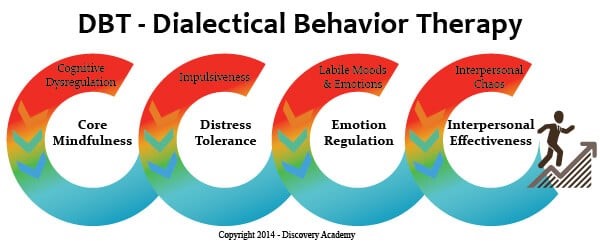Dialectical Behavior Therapy (DBT)
CFS’s “DBT” Group has begun, and seats are filling fast.
DBT skills are being presented on Tuesday at 6:00 p.m. via Tele-Health.

- DBT is a two part therapy—See Fact Sheet below
- Group meets from 6:00 until 7:30pm on Tuesday’s for the purpose of teaching skills.
- Clients meet with their therapists on a weekly basis to review skills and assist utilizing skills with individual’s issues.
- Cost per session is $30.00 cash or Credit Card. Prior to first session, Yulia will reach out to each client and secure Group rules, Group agreement, and Payment agreements.
- Clients will receive a packet (PDF) of the skills presented each week.
- Insurance will not be used for Group sessions.
Please direct any questions to Bob Jones:
(703) 791-9849
rjones@cfsvirginia.com
Fact Sheet
Characteristics of DBT
- Support-oriented: It helps a person identify their strengths and builds on them so that the person can feel better about him/herself and their life.
- Cognitive based: DBT helps identify thoughts, beliefs, and assumptions that make life harder: “I have to be perfect at everything.” “If I get angry, I’m a terrible person”. DBT helps people to learn different ways of thinking that will make life more bearable: “I don’t need to be perfect at things for people to care about me”, “Everyone gets angry, it’s a normal emotion.
- Collaborative: It requires constant attention to relationships between clients and staff. In DBT people are encouraged to work out problems in their relationships with their therapist and the therapists to do the same with them. DBT asks people to complete homework assignments, to role-play new ways of interacting with others, and to practice skills such as soothing yourself when upset. These skills, a crucial part of DBT, are taught in weekly lectures, reviewed in weekly homework groups, and referred to in nearly every group. The individual therapist helps the person to learn, apply and master the DBT skills.
Generally, dialectical behavior therapy (DBT) may be seen as having two main components:
- Individual weekly psychotherapy sessions that emphasize problem-solving behavior for the past week’s issues and troubles that arose in the person’s life. Self-injurious and suicidal behaviors take first priority, followed by behaviors that may interfere with the therapy process. Quality of life issues and working toward improving life in general and PTSD may also be discussed as well.
- Weekly group therapy sessions, generally 1 1/2 hours a session and led by a trained DBT therapist, where people learn skills from one of four different modules: interpersonal effectiveness, distress tolerance/reality acceptance skills, emotion regulation, and mindfulness skills are taught.
